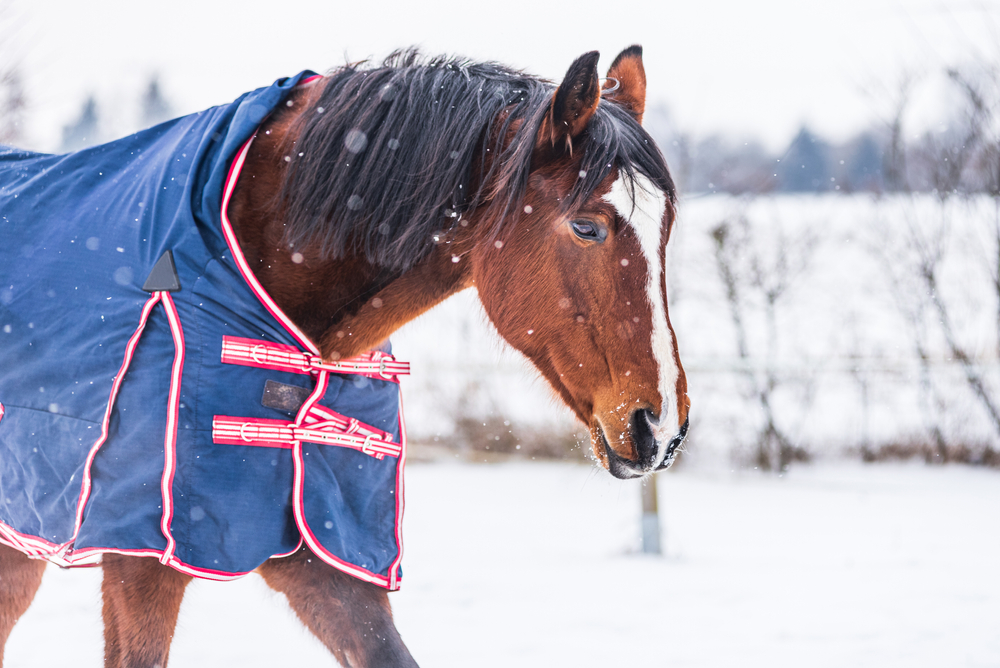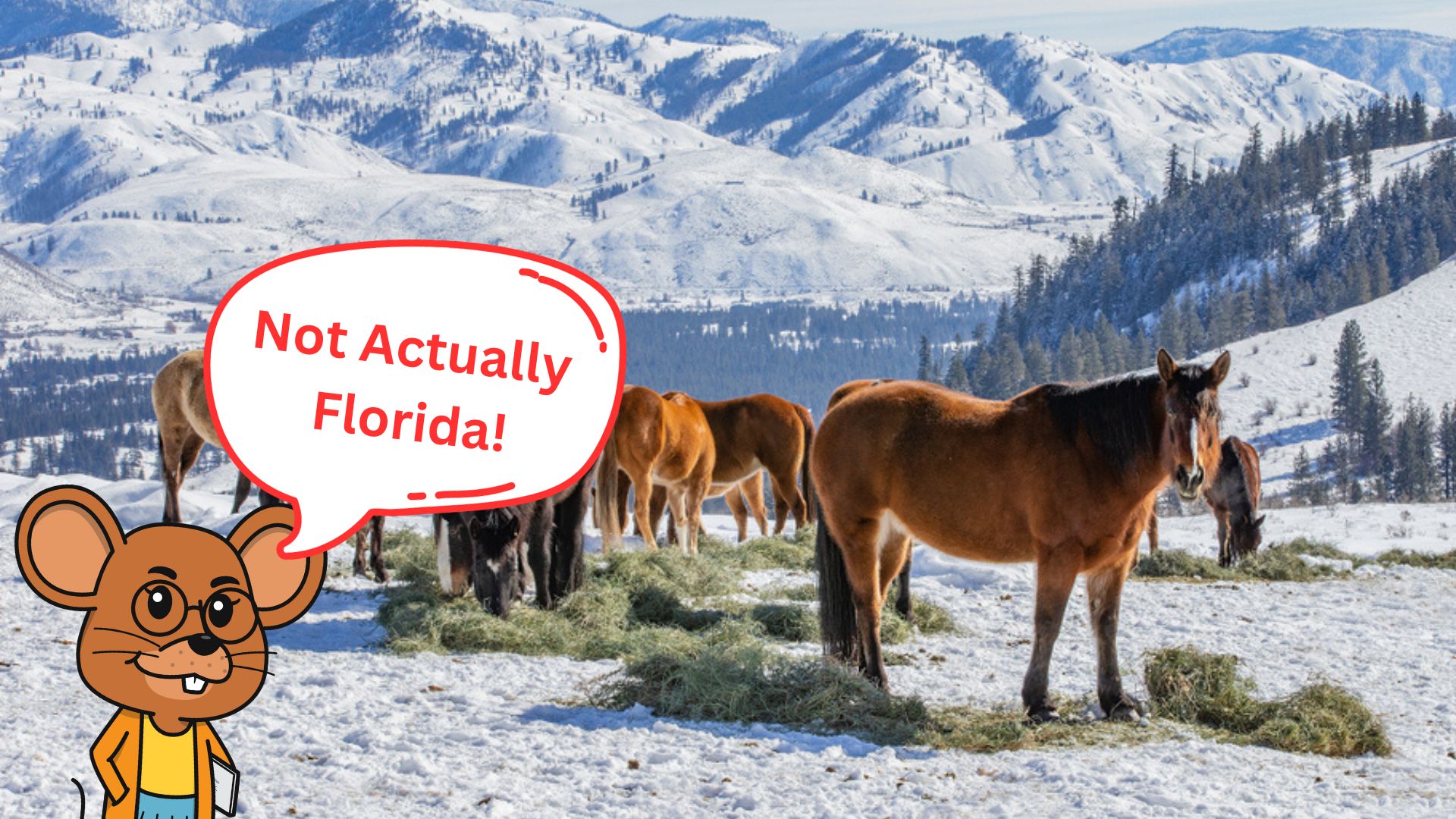Whinny’s Wisdoms

Hey everybody, Whinny here! It’s another rainy, winter day here. It’s not cold yet, because, well Florida, but that’s coming in the next few hours. It led this enquiring mouse mind to wonder how best to keep warm, and that got me wondering how best to keep a horse warm? This journey of horse knowledge is never ending! As a tiny field mouse who lives near a barn, I know I have some great choices. I like to find some roughage like old, dry grass, or leaves to make a burrow in. I grab some delicious snacks I’ve stored away, and snuggle down for a warm bite, followed by a cozy nap. Let’s find out if the same works for horses!
Hot Food
You humans like to warm up with warm things, like hot chocolate, tea, and coffee. It makes it tempting to offer things like warm mashes to horses. While they might like the idea of some hot oatmeal, with carrots, and apples, and all the trimmings, this is going to do far more for you humans than it will for a horse. First let’s consider the size of the critter. Tiny little field mouse me could eat some warm food, and actually affect my core temperature. Same for one of you humans. However, it has proven time and again that warm, or cold, water can’t be consumed in a high enough quantity to affect the body temperature of a 1200 pound horse. The water has to be so hot, or so cold, and in such rapidly consumed quantities that the laws of Nature don’t let this work out. Let’s also remember that horses prefer a slow change to their diet. Suddenly throwing a sugar and calorie laden meal at them is a recipe for a colic disaster. I recommend against it.
Long Hair
As someone with a luxuriant coat, I can attest to the insulation power of fur! You humans don’t understand this one at all, and trust me, it shows. If your horse has been living in their current environment for at least 12 months, the chances are they have an appropriate fur coat to handle the winter conditions for that area. I know, I know. This is hard to believe! It’s also hard to believe that Florida really doesn’t get that cold, but it’s true. No matter where they live, most horses will do just fine with the fur they have, provided some key needs are met. Moisture and wind decrease the ability of hair to hold on to heat. Ensuring your horse has somewhere to get dry and to get out of the wind will allow their fur to be all it can be. Winter coats can be compromised by things like poor nutrition, older age, and PPID (Cushings). These horses may need to have some added help to stay warm.

Blankets
Oh boy. I’m going to step my paw into this controversy. As we discussed above, most horses don’t need blankets. My limited experience has shown that most humans think most horses do in fact need blankets. Let’s discuss my research on who actually needs a blanket. Horses who have been body clipped definitely need blankets, but probably not as heavily as most humans think. One study taught horses to tell their handlers if they wanted their blanket on or off. It was found that when temperatures were below about 15F, all the horses wanted their blankets on. These horses were located in Northern Europe so they knew a thing or two about being cold. There hasn’t been a lot of study on horses in warmer environments, like the Southeastern United States. However, it is known that horses greatly prefer colder temperatures than the average Southeastern United States human. That 15F temperature is what’s known as their lowest critical temperature. This is the temperature at which it starts to cost the average horse more energy to stay warm than they can consume. Makes sense that this is when they want a blanket. This means that most horses, in most of the areas where horse people have them in most of the world, probably don’t need a blanket if they have their nutrition needs met, and have a place to get out of the wind and rain. But if your horse is body clipped, has a body condition score less than 5, or has a compromised hair coat thanks to PPID, consider a blanket. Remember though, that blanket can’t go on and stay on. You will need to have a plan for taking it off as temperatures go up through the day.
Roughage is Always the Best
And finally we get to the best way to keep a horse warm: Hay. Horses are hind gut fermenters (which means they produce heat while digesting hay). So are adorable little field mice. Turns out both of us stay warm by eating roughage, and using bacteria in our gut to break it down. Making sure your horse has plenty of good quality roughage to eat on cold, windy (or rainy) days will do the most to make sure they stay warm and happy. If in doubt, throw an extra flake or two.

Horse care always comes back to simple is best. Keeping them warm is the same. Make sure they have a dry place to get out of the wind, and offer lots of hay. And maybe put a little on the side for the mouse in your life. I’m just saying.
Until next week,
~Whinny
P.S. Have you seen the latest videos over on my YouTube Channel? I just published one explaining how to treat thrush with copper sulfate crystals and a wax ring from the hardware store. Well, the humans did it, but I was involved! There’s tons of great how-to horse healthcare videos on my channel, as well as seminars, the Horse Girl series, and more. Give it a gander. It’s the best free veterinary resource around, except for our Podcast! Not to brag, but Straight from the Horse Doctor’s Mouth is the biggest equine podcast in the world. Now that I mention that, I think I need to step my game up with my blog! Help a girl out and subscribe, would you?
 Whinny’s Wisdoms is the official blog of Whinny the Clinic Mouse at Springhill Equine Veterinary Clinic in Newberry, Florida. If you liked this blog, please subscribe below, and share it with your friends on social media! For more information, please call us at (352) 472-1620, visit our website at SpringhillEquine.com, or follow us on Facebook!
Whinny’s Wisdoms is the official blog of Whinny the Clinic Mouse at Springhill Equine Veterinary Clinic in Newberry, Florida. If you liked this blog, please subscribe below, and share it with your friends on social media! For more information, please call us at (352) 472-1620, visit our website at SpringhillEquine.com, or follow us on Facebook!
[jetpack_subscription_form title="Subscribe to Whinny's Wisdoms"]

